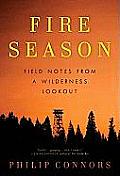
There is a fine tradition of writing by American fire lookouts, and in my own book I've tried to honor the inspiration they provided me without getting too bogged down in literary criticism. Philip Whalen, Gary Snyder, Jack Kerouac, Norman Maclean, Edward Abbey: all wrote memorably about being lookouts, but work in this vein pretty much petered out in the 1970s.
When there were thousands of us every summer, as was once true, the chances were better that a decent writer could be found somewhere in the bunch. Now there are only a few hundred, mostly with the Forest Service, but some as well in the Park Service and Bureau of Land Management, pretty much all of us in the West and Alaska. One very good book by a lookout was published in the 1990s — by Don Scheese, it's called Mountains of Memory — but I regret to report that it wasn't widely reviewed. So it's not like we've been a continuing presence in the popular imagination.
Plus, let's be honest, it isn't easy to write a compelling book about a job in which you sit and stare at mountains all day.
The best of what I've read on the subject of lookoutry tends to be aphoristic. This may explain why Gary Snyder's poems and journals are my favorite writing about the job, though they're scattered across his books, and you have to dig to find them. One of these, "Poem Left in Sourdough Mountain Lookout," written in the 1950s, ends on this great line:
& when, pray tell, shall lookouts die?
Not yet, my man. Not yet.
Jack Kerouac is the most famous lookout of all — in Fire Season I write about the thrill of spending time with his lookout journal at the New York Public Library — but he only worked one season, 63 days in total, and the experience of intense solitude almost drove him insane. In The Dharma Bums and particularly Desolation Angels, the lookout material is pretty much all about his interior dramas. I've often wondered what he would have made of the experience if he'd stuck with it a few more summers.
Norman Maclean's novella "USFS 1919: The Ranger, the Cook, and a Hole in the Sky," the last story in A River Runs through It, has some surpassingly beautiful passages about being a lookout around the time of World War I. The main character lives in a tent and climbs a tree to look for smoke along the Idaho-Montana border. At one point Maclean writes: "It doesn't take much in the way of body and mind to be a lookout. It's mostly soul." Ultimately, though, the novella becomes a picaresque tale about a group of woodsmen planning to con a card game back in town when fire season ends.
Edward Abbey wrote a couple of lookout essays I really like. You can find them in his books Abbey's Road and The Journey Home. The second of these, Fire Lookout: Numa Ridge, includes these great lines: "The technical aspects of a lookout's job can be mastered by any literate anthropoid with an IQ of not less than 70 in about two hours. It's the attitude that's difficult: Unless you have an indolent, melancholy nature, as I do, you will not be happy as an official United States government fire lookout." Abbey's attempt to make fiction of his lookout experiences resulted in the novel Black Sun — which, I regret to say, I find a saccharine and sentimental story of lost love, although Abbey often claimed it was the book of his that he loved best.
The finest lookout book ever written, in my contrarian opinion, is Abbey's classic, Desert Solitaire. I say contrarian because the book isn't about being a lookout at all. It's about his time as a park ranger in Utah's Arches National Monument (now Arches National Park). But it captures the joys and sorrows, the moods and textures of life in what's left of our wilderness in a way almost no other book does, and my hunch — and it's only a hunch — is that he would not have written so beautifully about that world without the experience of his many seasons as a fire lookout, which is just another way of saying a careful student of wild country.